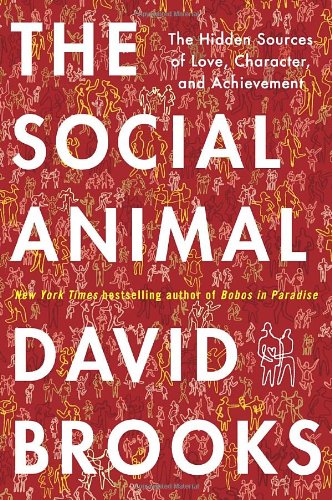 David Brooks’s The Social Animal is a book about how we become who we are, both consciously and unconsciously. It’s about how we grow up, how our relationships influence us, how we make decisions and how much control those decision have over our lives, how we learn, how our culture shapes us, how important language is to us, how we fall in love, how we control ourselves and what that self-control means to our lives, how intelligence works and what difference it makes, how we learn, how we succeed, how we create, how we find meaning in life, and how narrative contributes to finding redemption and making sense of the world around us.
David Brooks’s The Social Animal is a book about how we become who we are, both consciously and unconsciously. It’s about how we grow up, how our relationships influence us, how we make decisions and how much control those decision have over our lives, how we learn, how our culture shapes us, how important language is to us, how we fall in love, how we control ourselves and what that self-control means to our lives, how intelligence works and what difference it makes, how we learn, how we succeed, how we create, how we find meaning in life, and how narrative contributes to finding redemption and making sense of the world around us.
Now that’s a mouthful, but Mr. Brooks accomplishes this by weaving together the life stories of a man and a woman—who eventually marry—from who their parents were to their birth, through their schooling and into their careers, through their successes and failures, and into their old age up until the day the first of them dies. At each stage of life he explores their internal world: what is happening in their bodies and minds—and the social and cultural components that influenced who they became along the way.
It is an interesting look at what it means to be human, the complexity of our minds, and how it is not our rationality that makes us different from every other living organism on the planet, but it is the nature of our moral relationships to one another and the qualities of our souls. We become who we are because of the interplay of our exterior and interior worlds, between the physical, the soulish, and the social, between our conscious and unconscious minds, between our highest ambitions and our lowest inclinations.
Some might look at this evidence, look at the overwhelming power of factors we have no control over from our unconscious minds to the cultures and economic circumstances we are born into, and point to how little control we actually have in our own lives, trying to make some social-political point about improving conditions and educational opportunities. Mr. Brooks does not stand with these. Instead he points to our personal power to write our own stories, even though the process is more like remodeling a house than it is creating a turning point in our lives after which everything will change for the better. It is a process of redesigning things, knocking down walls, fixing plumbing, electrical issues, replacing the heat and air system, and reinforcing weak supports. There may be one point at which we decided to do it, but the process will take some serious time and effort.
As Mr. Brooks puts it at one point:
We’re born into cultures, nations, and languages that we didn’t choose. We’re born with certain brain chemicals and genetic predispositions that we can’t control. We’re sometimes thrust into social conditions that we detest. But among all the things we don’t control, we do have some control over our stories. We do have a conscious say in selecting the narrative we will use to organize perceptions.
We have the power to tell stories that deny another’s full humanity, or stories that extend it. . . .
We have the power to choose narratives in which we absolve ourselves of guilt or blame everything on conspiracies or others. On the other hand, we have the power to choose narratives in which we use even the worst circumstances to achieve spiritual growth. . . .
As Jonathan Haidt has put it, unconscious emotions have supremacy but not dictatorship. Reason cannot do the dance on its own, but it can nudge, with a steady and subtle influence. As some people joke, we may not possess free will, but we possess free won’t. We can’t generate moral reactions, but we can discourage some impulses and even overthrow others. The intuitionist view starts with the optimistic belief that people have an innate drive to do good. It is balanced with the pessimistic belief that these moral sentiments are in conflict with one another and in competition with more selfish drives. (291-2)
I enjoyed the book and learned a good deal about it. The way it weaves historic though, science, sociology, and psychology into a unified tale about what makes us human—and what is good about being human—is done masterfully. If you are interested in this kind of thing, I highly recommend it to you. I found it easy to read and with fascinating ideas to roll around in my head. I’m sure I’ll be pulling from Mr. Brooks’s research and insights for a book very soon. 🙂
David Brooks, The Social Animal: The Hidden Sources of Love, Character, and Achievement (New York: Random House, 2011).

Recent Comments